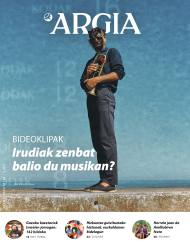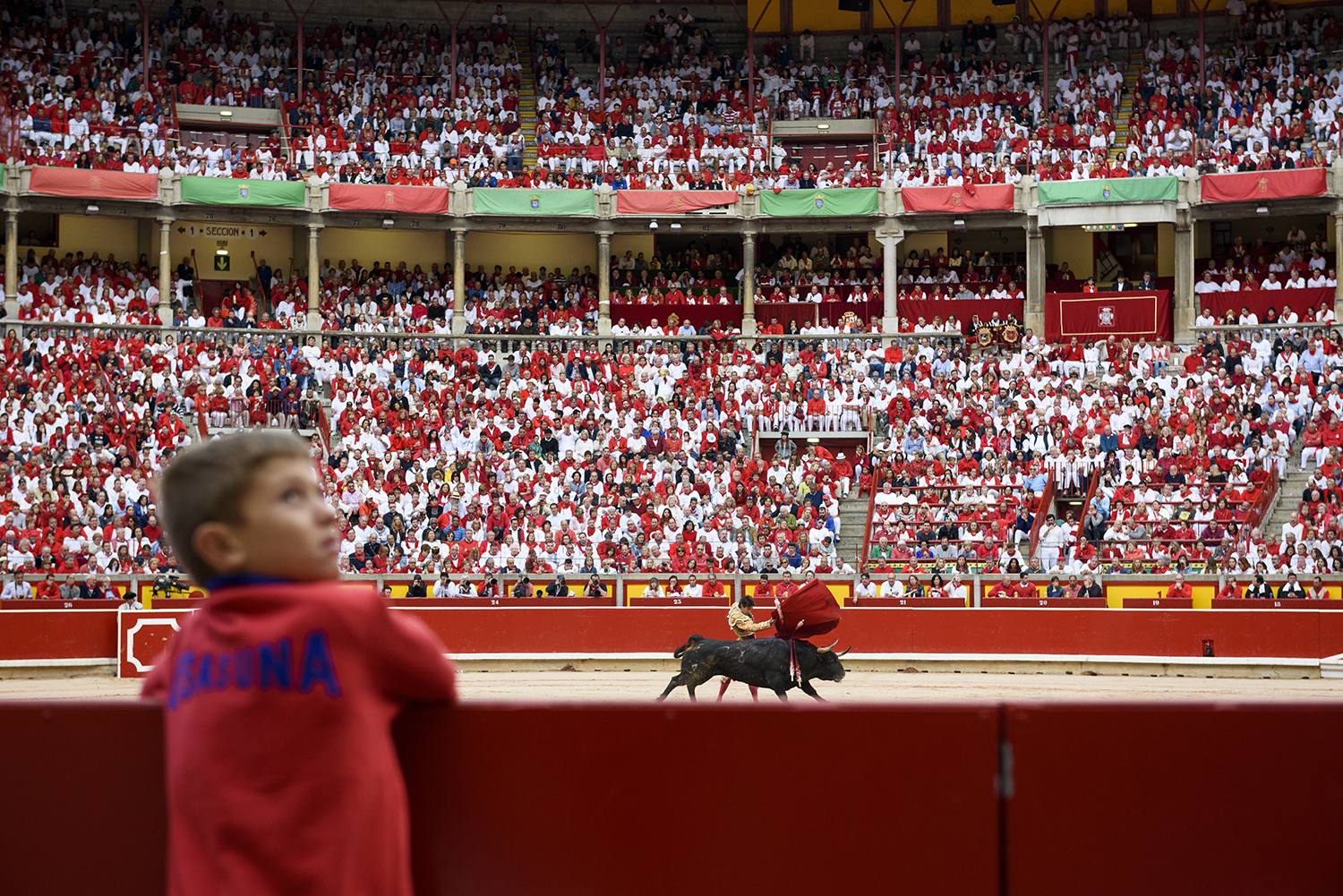The release of study animals from academia
- At the I Congress of Animal Critical Studies of the UPV/EHU, antispeciism has been worked from multiple angles, such as literature, intersectionality, the media, cinema and history. Researchers Estibaliz Ania Valle Ruiz de Garibay and Surama Lázaro Terol have observed the literature and intersectionality, respectively.

Research on the release of animals, penetrate among anti-specionist researchers and bring anti-specialism closer to academia. These are some of the goals of the congress. The congress, organized by the UPV/EHU and the research center UPF-Centre for Animal Ethics, brings together about 100 people. “We want to give visibility to anti-specialism, to offer potential anti-specionists the possibility of militating in the academic world and to motivate students to take into account the issue in research,” explains Irene Barañano, one of the organizers.
In her contribution, Estibaliz Ania Valle Ruiz, a researcher at the UPV/EHU, has presented through the literature some examples of specialism and its relationship with the current context. To this end, he studied the 17th century literature, in particular the excerpt of a book by the French writer, playwright and thinker Cyran de Bergerac (1619-1655): L'autre monde ou Les États et empires de la lune ou Les États et empires du soleil (The Other World or the States of the Moon and the Empire of the Sun). Cyran de Bergerac was one of the precursors of science fiction: “he criticized through science fiction some aspects of the time such as Catholic faith, absolutism and anthropocentrism.”
The episode tells the story of a man going to a kingdom mandated by birds. There they will judge man for crimes committed by humans against non-human animals. The researcher has highlighted that he is “very brave” for this time. When reading the text, it must be borne in mind that when the writer uses the word man he refers to men and not just men. In fact, in the seventeenth century women and other identities were not considered political subjects: “Women also depended on men, on the service and on the orders of men as animals.”
Importance of genealogy
The protagonist is at trial with a thief. Man presupposes that he rules an eagle, so he will be judged by him, but the thief tells him that he is wrong and that the criteria men use to decide who will be the head of government are not right. According to Bird, the “belief” of men is to think that only the “strongest”, the “largest” and the “most cruel” can govern. Instead, the thief highlights the criteria they use to choose the sovereign: “Our policy is very different, we choose the weakest, the sweetest and the most pacifiers to be kings. In addition, every six months we change them to other weak ones to avenge themselves in the event of opposition. We choose candy so we don't hate anyone. And we want us to be peacemakers to avoid wars, because they are the source of all injustices.”
The thief shows some examples of specialism: “This derisory superiority makes man assume our right to live and die, and enslaves him, the captive, chokes us and eats, and endows the nobles with the capacity to die.”
According to the researcher, the text questions anthropocentrism: “The author shows us that we can live in another medium and that there is a possibility of living in harmony. But to do so we must give up the supremacy that we human beings have assigned us.” In parallel, the writer proclaims that non-human animals are political subjects.
He adds that looking at the genealogy of antispecialism can serve to “reinforce” the movement: “Many times in the popular movement we forget genealogy. It is important to look at it and look for examples; when you have no examples it is difficult to take steps. It contributes to the structuring of the anti-speciist movement and to the development of anti-specialist history.” Despite the remoteness of the seventeenth century, “it has much to do” with the context and current demands: “Genealogy can help lay the foundations of socio-political thinking.”
Consequences of selective growth
The text by Cyran de Bergerac is a fragment that reflects the power relationship between human beings and non-human animals, but not the only one. There are many examples of them, both in fiction and outside it. UNED anthropologist Surama Lázaro Terol has jumped to nonfiction and focused her attention on racialization mechanisms and disability. It has analysed the influence of broiler and laying hens and selective growth on them.
He also mentions the work of scholar Sunaura Taylor and disabled activist. He writes the book Cript, where he reflects on the disability and oppression of non-human animals. According to Taylor, capitalism and specialism “incapacitate” and “hyperhabilitate” animals because the system forces them to produce more and more and produces serious consequences. Selective growth of hens is an example.
Vent sexting or sexual segregation of chicks emerged in Japan in 1920 and is a technique of sex-disaggregation. Lázaro stressed that knowledge of the sex of chickens immediately after birth has “sharpened” selective growth oriented to egg and meat production: “The goal is to achieve maximum productivity.” Thus, he denounced that chickens grow “faster” and that chickens lay “more eggs”.
In the 1940s, chickens needed 112 days to get between 2 and 25 kilos of commercial weight. In the 1990s this weight was reached in 37-43 days. In recent decades, they have been gaining weight for marketing, and according to the studies carried out, in 2034 it will take 29 days. All of this has “serious consequences” in chickens, such as skeletal abnormalities, metabolic diseases, problems of the cardiopulmonary system, excess fat and weakened immune system.
The Red Jungle Fowl chickens, before the domesticated chickens and the chickens, lay between 10 and 15 eggs a year. As a result of selective growth, 140 eggs were spawning in the twentieth century. In modern times, White Leghorn and Rhode Island chickens were formed, which doubled the number of eggs they laid. Currently, if they have been selected for meat or egg consumption, they lay between one hundred and three hundred eggs a year: “Excessive egg laying causes many damage to chickens, such as broken and bottled eggs, prolapse, bone weakness and peritonitis”.
Sanctuary Life color Raspberry
Lazarus has delved deeper into a practical case, highlighting his work with the Alavese hens The Frambuesan color life. The Shrine is the home of many species and its objective is to rescue animals, care for them and raise awareness about antispeciism.
Maria, one of the founders of the shrines, began eleven years ago to observe the chickens coming to the shrine. He discovered that, despite being in the shrine, the state of the chickens did not improve and they died soon. So he started making necropsies of the chickens that died, and he saw that in the breeding system there were tumors, broken eggs, infections, etc.
In search of a solution, in 2013 he decided to surgically remove the breeding system of chickens, but by removing the ovary he was at risk of severe blood loss and many died. So he decided to remove the obdite, but he didn't solve the problem either. Subsequently, subcutaneous hormonal implants were placed to stop ovulation. It has since used this system.
According to Lázaro, the work carried out in the sanctuary has taken another step in the freedom of non-human animals: “We must understand that it is inevitable that chickens will not get sick from racialization practices. That is why it is not enough to be outside the cages. It is essential to find resources for anti-specionists to provide adequate vigilance and reduce damage.” Hens are an example, but for Lazarus they are measures to be taken with all animals.
.jpg)
Animalien askapenaren aldeko mugimendu antolatuaren historiaz eta garapenaz mintzo dira hamabi ekintzaile antiespezista dokumentalean. Nor taldeak sortu du lana eta ostiralean ARGIAn izango da osorik ikusgai.
I found on the ARGIA website an article with a striking title of alliance between vegans and small farmers. I was questioned and encouraged to respond to the constructive attitude of the article that is to be welcomed. There it goes.
The commercial strategies being developed... [+]























